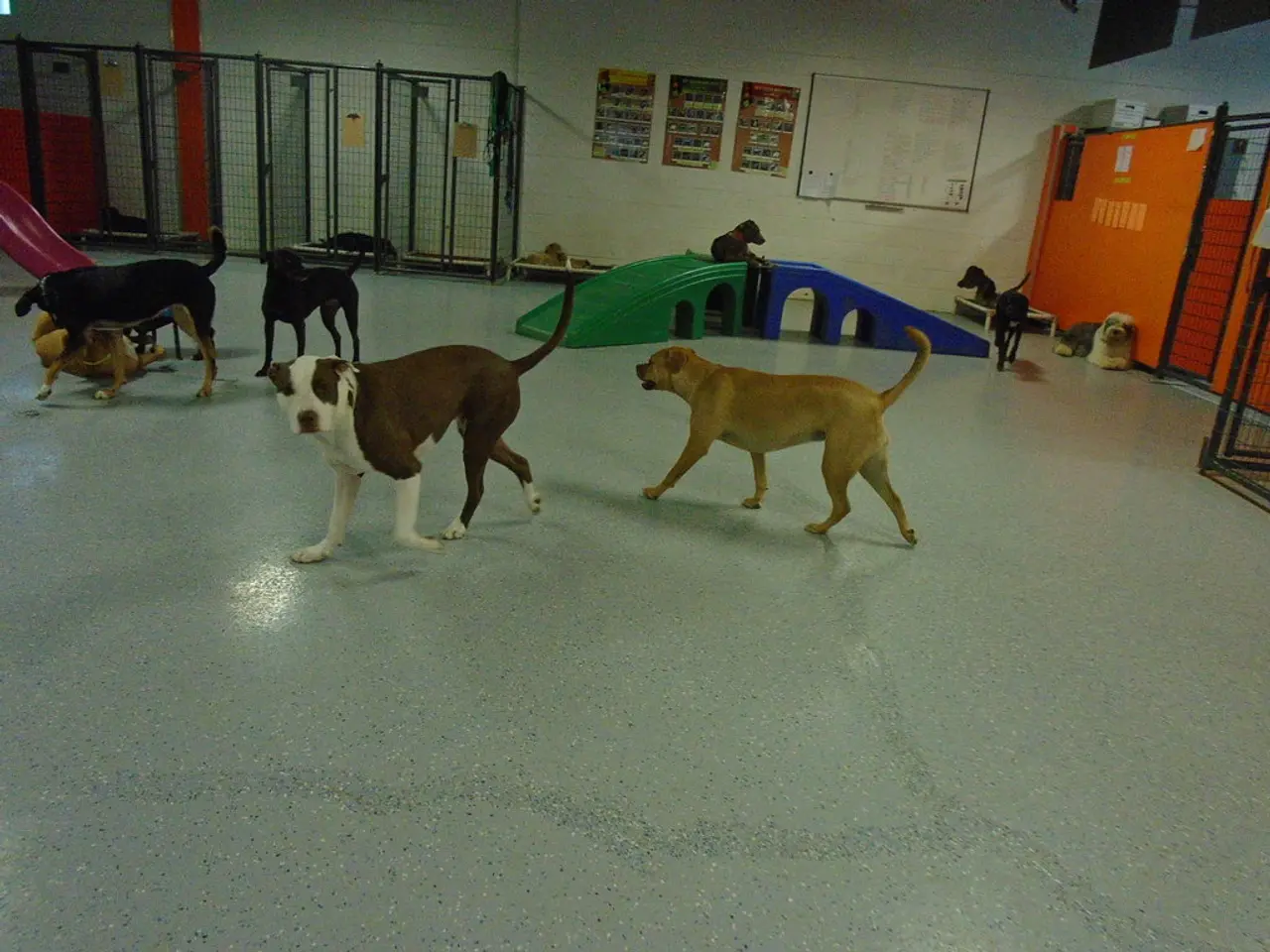Experiencing stress in dogs and needing assistance to aid recovery? Here's your guide for support
In times of stress, our canine companions can also feel anxious. To help your dog cope with stress and recover more quickly, here are some effective strategies and resources to consider.
First and foremost, maintaining a consistent daily routine provides stability and security for your dog. By ensuring predictable feeding, walking, playtime, and rest times, you create an environment that your dog finds less threatening[1][2].
Physical exercise and mental stimulation are essential for reducing excess energy and boredom-induced stress while building confidence. Puzzle toys, scent games, and obedience training are excellent examples of activities that can help[1][4].
Massage and acupressure techniques can release muscle tension, promote circulation, and stimulate calming endorphins, while gentle physical touch strengthens your bond and increases relaxation[1][3].
Creating a calm, safe space, such as a crate or cozy nook, gives your dog a place to retreat when they feel overwhelmed[1]. Calming aids like pheromone diffusers or weighted blankets can also provide additional support, but it's important to consult your vet to ensure their suitability[1].
Gradual desensitization to stress triggers through slow, positive exposure helps your dog become less fearful of specific stimuli, reducing anxiety over time[1]. Engaging in natural calming behaviors, like offering opportunities for sniffing, chewing, or licking through enrichment activities, provides mental enrichment and comfort by tapping into innate instincts[4].
If stress is linked to injury, rehabilitation therapies, such as massage, laser therapy, underwater treadmill, and therapeutic exercises, can ease physical discomfort that exacerbates stress[3][5]. Strength and balance exercises tailored to your dog’s needs can rebuild muscle and joint stability, reducing discomfort-related anxiety, especially after injuries[5].
The Calm Canine Academy suggests that stressed dogs may need more sleep than usual. Encouraging rest and facilitating high-quality, uninterrupted sleep in cool, dark, quiet places can support your dog's recovery[6]. Lowering expectations around your dog's responsiveness and emotional regulation can set them up for success after a stressful event[7].
During the recovery period, dogs may be more sensitive or easily triggered. Offering calmer, more relaxing activities can help them recover from stress[8]. If your dog is taking longer than expected to recover from a stressful event, it might be a good idea to speak to a vet[9].
You might find the Calm Canine Academy's advice on helping dogs recover from stressful experiences helpful. They are a resource for certified dog behavior coaches[10]. If you're looking for additional strategies, you might find 32 ways to destress your dog useful[11].
Remember, consistency and patience are key to helping your dog feel safe and relaxed again. Together, these approaches promote both emotional and physical healing in your dog.
[1] https://www.akc.org/expert-advice/lifestyle/8-ways-to-help-your-anxious-dog/ [2] https://www.petmd.com/dog/behavior/evr_dg_helping_your_dog_cope_with_stress [3] https://www.petmd.com/dog/behavior/evr_dg_massage-for-dogs [4] https://www.petmd.com/dog/behavior/evr_dg_calming-dog-techniques [5] https://www.petmd.com/dog/behavior/evr_dg_rehabilitation-therapy-for-dogs [6] https://www.calmcanineacademy.com/blog/stressed-dogs-need-more-sleep [7] https://www.calmcanineacademy.com/blog/lowering-expectations-after-stress [8] https://www.calmcanineacademy.com/blog/offering-calmer-activities-helps-stressed-dogs-recover [9] https://www.calmcanineacademy.com/blog/stressed-dogs-taking-longer-than-expected-to-recover [10] https://www.calmcanineacademy.com/about/us [11] https://www.akc.org/expert-advice/lifestyle/32-ways-to-destress-your-dog/
- For pets like cats and dogs, food can be a vital aspect of maintaining their well-being, and a consistent feeding schedule can help reduce stress.
- In addition to food, providing treats as rewards or during training sessions can help reinforce positive behaviors and reduce anxiety in pets.
- To help your pet cope with stress, creating a pet-friendly home-and-garden environment that includes cozy spaces for rest, like a cat bed or a dog crate, can provide a sense of security.
- If your dog or cat is experiencing behavioral issues due to stress, consulting a veterinary behaviorist or a certified pet behavior coach, such as those from the Calm Canine Academy, can offer guidance and effective strategies.
- While physical exercise and mental stimulation are essential for overall pet health and stress reduction, don't overlook the importance of proper medication and medical care when dealing with pet anxiety or stress-related conditions.
- In times of stress, maintaining consistency in your pet's daily lifestyle, incorporating calming techniques like massage or acupressure, and offering mental enrichment activities that stimulate natural calming behaviors can promote relaxation and emotional healing.



